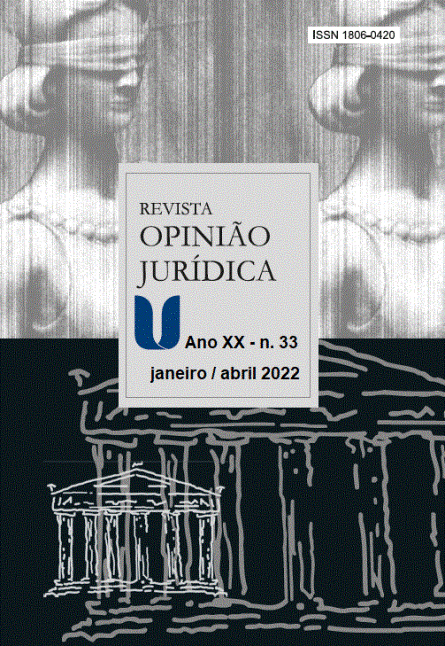THE RIGHT TO A BALANCED AND HEALTHFUL ECOLOGY IN THE LEGAL FRAMEWORK OF THE EUROPEAN CONVENTION OF HUMAN RIGHTS AND CASE LAW OF THE ECtHR
DOI:
https://doi.org/10.12662/2447-6641oj.v20i33.p103-134.2022Keywords:
right to healthy and favorable environment, Convention for the Protection of Human Rights and Fundamental Freedoms of 1950 (further - Convention), European Court of Human Rights (further - ECHR, Court), environmental cases, ecological cases, eco-cases, huAbstract
Objective:The author seeks to understand the content and legal guarantees of the right to sustainable, healthy and favorable environment in the jurisprudence of the European Court of Human Rights. The researcher seeks to list the case law of the ECtHR corresponding to environmental issues in order to define concrete aspects related to responsibility of the States for the climate change and global warming. The author analyzes new legal trends on the protection of the rights of individuals and groups to complain for violations of their rights to a healthy and favorable environment in the light of the European Convention on Human Rights. The article is focused on positive state obligations on a healthy and sustainable environment under the Convention provisions, Russian experience in eco-cases, admissibility criteria for complaints to the European Court of Human Rights in “environmental cases”. The writer gives an overview of the ECtHR’s legal positions on the right to a healthy and favorable (i.e. prosperous, clean, safe, quiet, calm, quality) environment by type of its pollution. The author considers the importance of facilitating the right to healthy environment according to the UN Sustainable Development Goals.Methodology: The research uses general scientific and special cognitive techniques wherein legal analysis and synthesis, systemic, formal-legal, comparative-legal, historical-legal and dialectical methods are applied. The author applied a case study method to select the most recent and pilot cases of the ECtHR practice.
Results: The author founds out that despite the fact of a non-exhaustive list of the legal positions of the ECtHR concerning the environment effect on human life and health, there is a certain trend in Council of Europe towards an extended interpretation of the human right to healthy ecological situation responding to new challenges to the realization that right, such as, the decarbonization of industrial processes, right to light, right to fresh air, clean water and clean atmosphere, etc. The study concludes with an idea that right to sustainable, healthy and favorable right is a collective right. From the practical perspective, potentially group of individuals should complain to the international judicial institutions to the violation of this right. The importance of the protection of that right is increasing within the technological progress. The right to healthy environment imposes to the European States a legal obligation to ensure right to life, prohibition of torture, right to privacy, right to a fair trial, right to an effective remedy and prohibition of discrimination. The researcher also point out that cases of environmental rights violations are complicated in terms of preparing a complaint and processing by the ECtHR. Due to this fact, it is hard to do so with regard to the causal link between the acts (omission) of state agencies, the violation of environmental rights and the consequences that occurred. It is not clear from the text of the Convention which article directly should be applied.
Contributions: Following a review of the content, the author raised possible problems, strategies, suggestions and guidelines for the protection of the right to sustainable and healthy environment. The author concluded that near future new categories of legal cases related to the state responsibility for global warming and climate change will appear in international and national judicial system. The author encourages the complement to the international legal regulation of the protection of the right to healthy, sustainable and favorable ecology on universal and regional level.
Downloads
Published
How to Cite
Issue
Section
License
CESSION OF COPYRIGHTS
The submission of articles to analysis for publication on Opinião Jurídica implies the author(s) transfers copyrights to Centro Universitário Christus – UNICHRISTUS for reproduction, publicizing, distribution, printing and publication, according to the Publication Norm 414R, Opin. Jur., Fortaleza, year 12, n. 16, p.1-414, Jan./Dec. 2014, costs to be bore by UNICHRISTUS, in whatever format or means that may or shall exist, in accordance to articles 49 and following of Federal Law 9.610/98.
1. In ceding copyrights, the author(s) agrees to do so in exclusivity, free of charge and for the totality of the work.
2. UNICHRISTUS may make the work, in its entirety or in parts, available for scholarly purposes, without altering its contents, except for small corrections that are deemed necessary.
3. The cession of copyrights is valid in all countries and for versions of the material in its original language or translated into a foreign language.
RESPONSIBILITY FOR THE CONTENT
By submitting an article, the author(s) declare to have sole responsibility for the content of the piece and is(are), therefore, responsible for any judicial or extrajudicial measures referring to it.
1. In case of joint authorship, all authors are considered collectively responsible, except when proved otherwise.


















